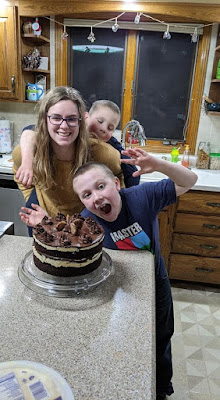Note: I originally published this post in 2018. Rather than reinvent the wheel, I decided to simply update my 2018 post because it shares some great information about CDG.
The epiphany I had as I attended a Rare Disease Day conference for Wisconsin is there's different levels of rare. There's rare that's 1:40,000 odds like Pompe Disease that stands to benefit from early detection and treatment. Then there's CDG-PIGN, with less than 100 known individuals in the 7.6 billion world population. Early detection provides some answers for families but no clear treatment. That's why something like Rare Disease Day, to encourage all of us to learn about different disorders help. There's so little known about Teddy's diagnosis and so little interest in research because it affects so few people. Thanks for taking a few minutes to learn more about what rare means to us.
In honor of today being Rare Disease Day, I'm giving you the rare opportunity to take a rare child off my hands for a few hours ... or days ... or weeks? I'm kidding, of course. Mostly. At least about the weeks part.
It's just been one of those tough weeks, but that happens sometimes in our world. Let's be real. Rare is tough. Rare is hard. Rare is full of unknowns. Rare is full of worries and fears. Rare is living through some of those worries and fears.Wait, though. There's more.
Rare opens doors to worlds we didn't know existed. Even though I worked in Human Resources for a company that supports people with disabilities, I never completely understood it until it became my life. It's almost as if there's secret worlds that aren't secret at all ... we often can't see these other worlds because we're so blinded by our lives and priorities.
Rare is appreciation for the little things because they're not little things. Teddy traced a triangle last week. That's not little. That's monumental.
Rare is knowing and experiencing the incredible support from family and friends. I'm certain that many of us have people in our lives who would drop everything or come to our aid if we needed it. We've been blessed to experience that support. Granted, I wouldn't wish the circumstances where that support was needed upon others, but it is a true blessing to experience that unfailing love and support.
Rare is finding those incredible doctors, therapists and teachers who dedicate a portion of their lives to your child's success and well being. Talking to doctors at the National Institutes of Health who knew about CDGs was rare.
Rare is understanding you're not alone. The group of parents whose children share CDG-PIGN get it. They can provide advice, support, a listening ear or a story of something much worse that happened to them to provide perspective. This group gives me more sanity than they might realize.
Rare is understanding that a smile is universal. And the realization that a smile is what so many people need in our busy, stressful lives. And the gratitude that one of Teddy's gifts to the world is his smile ... even when he smiles with a mischievous twinkle because he's about to push your buttons.
Rare is our life because Teddy has CDG-PIGN. And since that's a confusing acronym, here's a short video that explains the CDG portion, even though it's a different variation of CDG:






